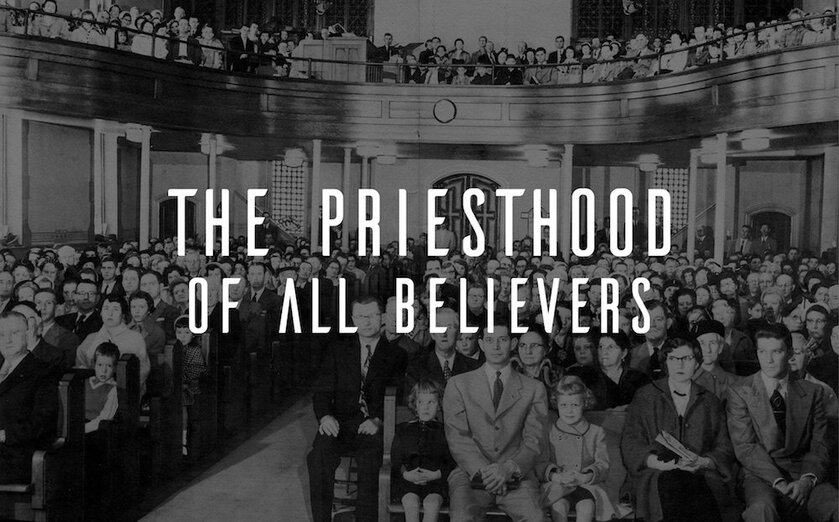From Yokes of Burden to Tents of Grace: Unmasking Legalism’s Enduring Grip in God’s Sovereign Family
Acts 15:1 (read vs. 1-21)
But some men came down from Judea and were teaching the brothers, "Unless you are circumcised according to the custom of Moses, you cannot be saved."
So, things regarding evangelism are going fairly well among the Gentiles in the first century, but there are these folks who are now followers of Christ's "Way" but are from "the party of the Pharisees". And these men were stirring up trouble among the Church. As a result, Acts 15 addresses one of the first major conflicts in Christianity: how to integrate Gentile believers without imposing the full weight of Jewish law.
Peter handles it in short order:
Acts 15:7-11
And after there had been much debate, Peter stood up and said to them, "Brothers, you know that in the early days God made a choice among you, that by my mouth the Gentiles should hear the word of the gospel and believe. And God, who knows the heart, bore witness to them, by giving them the Holy Spirit just as he did to us, and he made no distinction between us and them, having cleansed their hearts by faith. Now, therefore, why are you putting God to the test by placing a yoke on the neck of the disciples that neither our fathers nor we have been able to bear? But we believe that we will be saved through the grace of the Lord Jesus, just as they will."
This gathering in Jerusalem was like an early church summit. Salvation, Peter emphasized, is "through the grace of our Lord Jesus" for both Jews and Gentiles. Peter, rationalizing the situation, says, "why are you putting God to the test by placing a yoke on the neck of the disciples that neither our fathers nor we have been able to bear?" This mirrors Jesus essentially asking the Pharisees' and the Jews who were going to stone the adulterous woman, "which of you hasn't sinned?" If you recall, Jesus confronted these Pharisees and scribes who brought a woman caught in adultery, ready to stone her per Mosaic Law (Deuteronomy 22:22). He responds, "Let him who is without sin among you be the first to throw a stone at her" (John 8:7). This exposed their hypocrisy: They enforced a law they couldn’t perfectly uphold themselves, using it as a trap rather than justice as described in Micah 6:8.
Peter challenges the Pharisee-party believers: Why impose a "yoke" (the Law) that Jews historically couldn’t bear without failure? Both scenarios highlight human inconsistency in legalism, demanding from others what we can’t achieve on our own. Jesus’ question leads to dropped stones and freedom for the woman; Peter’s leads to dropped requirements and freedom for Gentile believers. At the core is mercy triumphing over judgment, revealing God’s heart for grace over condemnation.
James 2:13
"because judgment without mercy will be shown to anyone who has not been merciful. Mercy triumphs over judgment."
So, the young emerging church is beginning to grow and mature in their theology and ideology. They are beginning to build a culture of grace for the most part. And even Paul and Barnabas speak their minds on this subject. But following this James, the half-brother of Jesus, the leader of the Jerusalem sect, gives great insight into what they must believe and take to heart as a community of believers.
Acts 15:13-18
After they finished speaking, James replied, "Brothers, listen to me. Simeon has related how God first visited the Gentiles, to take from them a people for his name. And with this the words of the prophets agree, just as it is written,
"‘After this I will return, and I will rebuild the tent of David that has fallen; I will rebuild its ruins, and I will restore it, that the remnant of mankind may seek the Lord, and all the Gentiles who are called by my name, says the Lord, who makes these things known from of old.’
There are some today who try to make prophecy concerning Israel apply to the Christian church as a whole. They declare that God's work with Israel is finished, and their eschatology has the Christian church going through The Great Tribulation. They believe Israel had their opportunity and prophecy now speaks only to the church. James here recognizes that God has drawn out for himself adopted children from the Gentile nations. And through His Grace, salvation is available for all, regardless their race or ethnicity, Jew and Gentile. God already knows those who is being drawn out from the world. God is not limited in His knowing in regard to these things...
"the Lord, who makes these things known from of old.’"
He's known from the very beginning what was to come, who is to come, and from where they will come. His invitation is to those whom He already knows is destined to join Him. There are no surprises with God, He's omniscient. God knows Israel will be set aside, restored, and a remnant saved for eternity in Him.
James’s words here are a beautiful affirmation of God’s eternal plan, where grace extends an invitation that’s both sovereign and inclusive. By quoting Amos, James isn’t just resolving the debate; he’s unveiling how God’s knowledge "from of old" encompasses the redemption of all peoples, drawing adopted children from every corner of the earth. Not replacing Israel with the church, but grafting the Gentiles into His family Israel. This shifts the early church’s perspective from surprise at Gentile inclusion to awe at God’s timeless wisdom.
This echoes the adoption language in Ephesians 1:4-5, where Paul describes believers as chosen "before the foundation of the world" to be adopted as sons and daughters through Jesus. It’s not random; God actively selects and draws (John 6:44), forming a family that transcends bloodlines. For the Jewish audience, this was revolutionary. Gentiles, once "aliens from the commonwealth of Israel" (Ephesians 2:12), are now co-heirs by Grace.
The prophecy in verses 16-17 shows the rebuilt "tent of David" (Jesus’ messianic kingdom) as a beacon for "the remnant of mankind" and "all the Gentiles who are called by my name." Race or ethnicity doesn’t qualify or disqualify; it’s Grace alone (Titus 2:11). This universality fulfills promises like Genesis 12:3, where Abraham’s blessing extends to "all the families of the earth." No one earns entry, it’s God’s gracious call, breaking down walls (Ephesians 2:14).
And so, it's a blessing to witness here in God's word this early affirmation of Grace alone theology. Yet even today there is another remnant that follows the church. There remains today a remnant of these Judaizers. There are many fundamentalist sects today that teach faith and works salvation akin to these earlier times. And some are no small part of the body of modern Christian culture. The spirit of the Judaizers persists today, manifesting in teachings that blend faith with works for salvation. And for the same reasons, they want to burden others with burdens they themselves could not bear.
Why?
Why does this spirit exist?
What would be the motive?
Biblically and historically, this tendency arises from a mix of sincere but flawed intentions, rooted in our fallen nature. Scripture doesn’t shy away from diagnosing why legalism endures. At its core, it’s a human inclination to rely on self rather than God, echoing the original temptation in Eden:
"You will be like God" (Genesis 3:5).
Legalism appeals because it lets us feel we’ve "earned" salvation, boosting our ego. Paul describes this as boasting in the flesh (Philippians 3:3-9), where people trust in their own righteousness rather than Christ’s. It’s the Pharisee’s prayer:
"God, I thank you that I am not like other men" (Luke 18:11).
Salvation by works seems right in the eyes of man, fulfilling a basic desire to control their own destiny. Some impose rules to prevent "cheap grace" or antinomianism (lawlessness). They worry that grace alone leads to sin, so they amplify Scripture with extra definitions or restrictions.
And many are just plain ignorant, blending faith and works due to an incomplete grasp of the gospel, thinking justification requires ongoing obedience, not just faith (Romans 4:5). It echoes Satan’s deception that there’s something other than God’s way, leading people to believe salvation is earned by compliance.
Jesus Himself critiqued this in the Pharisees, who "tie up heavy burdens…but they themselves are not willing to move them with a finger" (Matthew 23:4). The motive? Often control, over others or one’s own insecurities, rather than humble dependence on grace. Today, this spirit shows up in various sects, from strict fundamentalist groups emphasizing rituals for assurance to broader cultural tendencies. You see this in Orthodoxy, the Romanized Papist Church's, Mormonism, Jehovah Witnesses, Seventh Day Adventists and unfortunately many others.
Orthodox theology views salvation as theosis, a lifelong process of becoming like God through union with Him, empowered by grace. It’s not "faith vs. works" but "both-and."
Catholic doctrine teaches salvation by grace alone, but through faith that is "formed by charity" (works of love), as per the Catechism and Council of Trent. Justification involves initial grace received in baptism, sustained by faith and "cooperation" via sacraments and good works, which "merit" increases in grace but don’t earn initial salvation. So, it's faith but progressive faith that is still essentially earned, “faith plus works”.
The Church of Jesus Christ of Latter-day Saints teaches that salvation comes through Christ’s atonement, but it’s conditioned on faith, repentance, baptism, receiving the Holy Ghost, and enduring in obedience to ordinances and laws. At least they don't equivocate about their legalism. They parallel the Judaizers’ insistence on customs for full acceptance, blending grace with mandatory actions.
Jehovah’s Witnesses believe salvation is a “free gift” through faith in Jesus’ ransom sacrifice, but it must be demonstrated by obedience to God’s commands, association with the Watchtower organization, and good works. While grace is emphasized, salvation combines faith, works, and loyalty to the organization, a trait all these organizations share.
Adventists claim to affirm salvation by grace through faith alone, as a gift received by accepting Jesus, with works as the fruit of genuine faith, not its cause. Yet, it's very obvious to perceive legalism in lifestyle emphases (diet, keeping the Sabbath).
Many Christian traditions integrate works into salvation in ways that can echo the Judaizers’ motives, pride in achievement, fear of license, or control through organizational structures. The spirit of the Judaizers is alive and active throughout the many different churches.
Biblically, Peter and James in Acts 15 prioritized grace for all, warning against yokes we can’t bear. This challenges us: In our own circles, do we add unspoken “works” for acceptance?
Let’s emulate the early church, test teachings against Grace, extend mercy to differing believers, and proclaim freedom in Jesus. True faith produces works naturally (James 2:18), yes this is true, but without earning it or the acceptance of an organized religion.
Reflection:
How can recognizing these patterns help you cultivate deeper dependence on Grace in your daily walk?
Prayer:
Sovereign omniscient Lord, thank You for the clarity of Grace in Your Word, exposing burdens that hinder and create unnecessary stumbling blocks to faith. Forgive where we’ve added to Your gospel or judged harshly. Illuminate hearts in every tradition to rest in Christ’s finished work. Guide us to live freely, bearing fruit from Your Spirit, Your fruit, not self-effort. In your Son Jesus' Holy name, Amen.




















